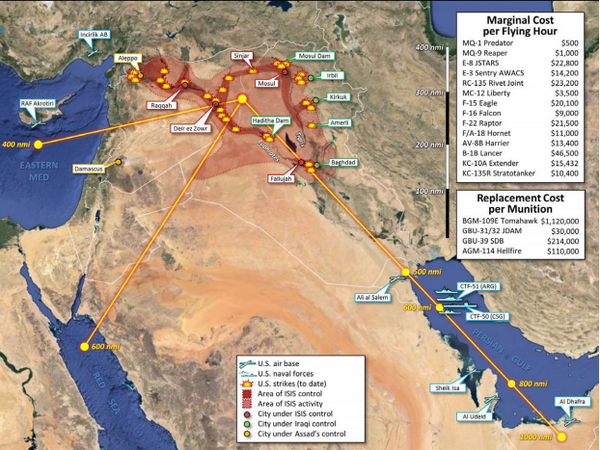 A pair of U.S. Air Force F-15E Strike Eagles fly over northern Iraq after conducting airstrikes in Syria, in this U.S. Air Force handout photo taken early in the morning of September 23, 2014. (Reuters/U.S. Air Force/Senior Airman Matthew)
A pair of U.S. Air Force F-15E Strike Eagles fly over northern Iraq after conducting airstrikes in Syria, in this U.S. Air Force handout photo taken early in the morning of September 23, 2014. (Reuters/U.S. Air Force/Senior Airman Matthew)
The US-led military operation against the Islamic State (IS, formerly ISIS) militants has likely so far cost between $780 and $930 million, according to an estimate by Washington-based think tank specializing in defense issues.
The estimate is part of a report attempting to forecast how much the operation might cost in the future. It was published on Monday by the Center for Strategic and Budgetary Assessments (CSBA), that’s influential with the US Department of Defense.
The think tank’s defense experts, many of whom are military veterans, have used a figure given by the Pentagon itself, which said that the military operations against the Islamic State cost $530 million through August 26.
The group’s own estimate covers the period from August 27 through September 24 and is based on “what is publicly known about the number of targets struck, the types of aircraft and munitions used, the basing options available to US forces in the region, and the number US ground forces in the region.”
The various costs associated with the military actions against the IS have been reflected in a graphic, issued by the CSBA.

How much will operations against #ISIL cost? CSBA’s estimate:
“The total cost to date from mid-June through September 24 is likely between $780 and $930 million,” the report says.
It further comes up with possible estimates of three scenarios of the way the military operation will develop in the region.
“Assuming a moderate level of air operations and 2,000 deployed ground forces, the costs would likely run between $200 and $320 million per month,” the study says.
If the airstrikes moderately intensify and 5,000 ground forces are deployed, the cost would be driven to $350 and $570 million per month.
Finally, if the military campaign “expands significantly” and 25,000 US troops are deployed, the monthly cost of the operation might grow to $1.1 to $1.8 billion.
Annually the first scenario would cost the American budget $2.4 to $3.8 billion per year, while the third, highest-intensity, one would require the US to spend $22 billion.
The US started the military operation against the Islamic State in June 2014 by increasing support to Iraqi and Kurdish forces fighting the extremist group.
The US airstrikes against the Islamic State targets in Iraq were launched August 8 and in Syria September 23. President Obama made a decision on the airstrikes without the authorization of the US Congress. Lawmakers might not vote on the move until next year, congressional aides told Reuters on Monday.
Members of Congress left Washington in mid-September to campaign for upcoming elections. They will return in mid-November and will likely be reluctant to vote on authorization for the use of military force in Iraq and Syria in the last weeks of the current Congress.
President Obama announced crackdown on the Islamic State group in a landmark September 10 speech. He specified that American ground troops would not be involved in the fight against the militants.
Senior US military officials have, however, not excluded the ‘boots on the ground’ option. The chairman of the Joint Chiefs of Staff, Gen. Martin Dempsey, said in mid-September that should Obama’s current strategy not yield the desired results, he would recommend deploying American troops on the ground.
Estimates on the possible cost of the military campaign have varied. Last week, a defense spending expert, Gordon Adams, a professor of US foreign policy at American University, told Huffington Post he estimated the United States’ war on the militant group could be costing taxpayers up to $1.5 billion a month.
The views expressed in this article are the sole responsibility of the author and do not necessarily reflect those of the Blog!
No comments:
Post a Comment